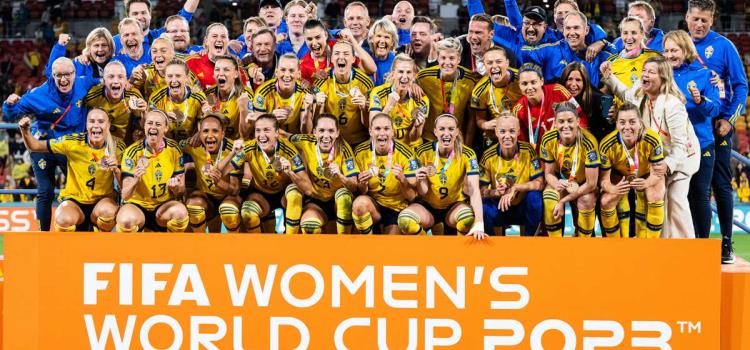
In a thrilling clash that showcased the grit, determination, and skill of women's football, Sweden emerged triumphant over the co-hosts Australia in the third-place match of the Women's World Cup. As the stadium reverberated with cheers from a handful of Swedish supporters, the Swedish players basked in their hard-earned victory, securing back-to-back bronze medals in the prestigious tournament.
Yet, in the annals of history, this victory might be seen as a missed opportunity for Sweden, as many of their players are approaching the twilight of their careers. The team's achievement in securing a place on the podium is undoubtedly commendable, but one can't help but ponder what could have been.
Sweden, however, has firmly established itself as the master of the Women's World Cup third-place play-off, adding a fourth victory to their storied tournament history. Their triumph today was a testament to the character of the players and the unwavering dedication they brought to the final moments of the competition.

Under the guidance of Gerhardsson, the team displayed a thoroughly professional performance that underscored their prowess in both defence and attack. They outclassed Australia in every aspect of the game, leaving no room for doubt about their superiority. On another day, the scoreboard might have read three or four goals in Sweden's favour, reflecting the dominance they exhibited.
While a coveted Women's World Cup final still remains elusive for Sweden, their consistent performances hint at a bright future on the horizon. Stina Blackstenius, a standout player, demonstrated her influence throughout the tournament. With her relentless pursuit of defenders, pursuit of lost causes, and offensive prowess, she has been a driving force behind Sweden's success.
Blackstenius's impact was evident in both of Sweden's goals in the match against Australia. The first goal materialised as she sprinted down the channel, drawing a clumsy foul from Hunt. This set the stage for Sweden to take the lead. For the second goal, Blackstenius's perfectly timed run, combined with her physical strength to fend off defenders, culminated in a precision pass that set up Asllani to deliver a stunning finish.
As Blackstenius gears up to join Arsenal, her impressive performances down under serve as a testament to her readiness for the challenges that lie ahead. While her move to Arsenal might introduce healthy competition for the striker position, her time in the Women's World Cup has affirmed her ability to rise to the occasion.
As the final whistle blew, emotions were a contrasting tapestry of disappointment and elation. Australia, despite their valiant efforts, were left with a sense of frustration as their tournament journey concluded without a medal. In contrast, Sweden celebrated their bronze finish with genuine pleasure, concluding their World Cup campaign on a high note.
Beyond the immediate realm of victory and defeat, Australia's Women's World Cup journey has left an indelible impact on the global football landscape. The tournament's record-breaking attendances and viewership figures have propelled women's football to the forefront of public interest. Moreover, the enthusiasm generated by the competition is likely to inspire a surge in grassroots football participation, particularly in the women's game.

Sweden and especially Australia, have etched their names in the tournament's history, reminding us of the enduring power of the beautiful game and its ability to unite and inspire across the globe.
Share this story:
Tweet








